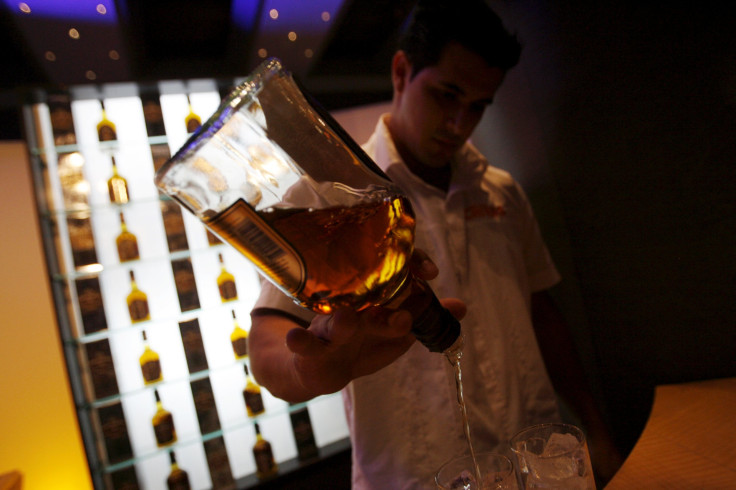Scottish Independence Could Mean More Expensive Scotch Whisky

Some Scots may be drunk with joy if the country votes for independence from the U.K. Thursday, but Scotch whisky aficionados might be left to drown their sorrows. If Scotland approves its long-awaited referendum to become an independent country, liquor and trade experts say the price of Scotch whisky could see a big jump around the world, particularly in the short term.
Scotch whisky is big business, so any major shift in price, supply or distribution could have major implications. Whisky is Scotland’s second-biggest export after oil, totaling $6.9 billion in exports last year and representing 25 percent of the U.K.’s overall edible exports market, according to Scotch Whisky Association (SWA) figures.
Scotch comes in both single-malt and blended varieties, and is synonymous with class for many around the world. From the expensive Macallan Single Highland Malt Scotch Whisky to J&B Scotch Whisky, an affordable blended variety that sells itself as “the ultimate party whisky,” the liquor is a staple of bars and liquor cabinets around the world.
“A ‘Yes’ vote will likely drive up the prices of single-malt scotch in the short term,” Josh Green, CEO and co-founder of Panjiva Inc., a data-based global trade analysis firm, said Thursday. “The attention lavished on Scotland will likely drive up demand for the world's greatest beverage, as more people raise their glasses in honor of the newly independent homeland of Scotch.”
But it’s not just the potential for a supply crunch as Scottish people and sympathetic tipplers celebrate independence by going through bottles of Scotch at an unprecedented clip that has observers nervous.
Some insiders worry that the uncertainty caused by independence could cause a spike in Scotch prices, as taxation and regulatory regimes would need to be established to replace both those currently in place within the U.K. and the ones that dictate export. Scotland could even be left without a currency union with the rest of Great Britain, a situation that could drive significant uncertainty regarding payment for whisky shipments.
“In short, as we consider the potential impact of constitutional change, we look for reassurance on how an independent Scotland could deliver a business, regulatory and export environment at least as supportive as that which the industry currently enjoys,” David Frost, chief executive of the SWA, wrote in a Sept. 11 statement.
Bilateral trade agreements between the U.K. and other nations may also need to be renegotiated or terminated if Scotland becomes an independent nation. That could leave the new country unable to access the tariff-free export arrangement between the U.K. and the European Union’s other 27 member countries, which purchased 45 percent of Scotland’s 2012 exports, according to the Telegraph.
“As a result, Scotch could face increased competition from other spirits and might lose competitiveness in key EU markets,” Dutch bank Rabobank said in a report by the Guardian.
Other trade relationships could be disrupted if agreements made with the U.K. are not upheld when a newly independent Scotland starts shipping goods abroad. Barley subsidies provided by the E.U. could be in question, driving up the price of the crucial ingredient, Fox News reported. And the E.U. and U.K. could even reevaluate Scotch whisky’s designation as a protected class of locally produced good, opening the doors to imitators.
The challenges of negotiating new trade deals would represent “a mountainous task” for the new Scottish government, Rabobank told the Guardian.
But Green believes the concerns may be overblown when it comes to Scotch prices and trade in the long run.
“A Yes vote will introduce uncertainty across a lot of fronts. But this uncertainty will be a short-term phenomenon,” he said. “Over the long term, things will get sorted out, and the world will have reliable access to this crucial natural resource.”
Indeed, there is a real potential for Scotch prices in some markets to fall in the long term if Scotland becomes an independent nation, particularly for buyers in the remaining parts of the U.K. who are willing to trek to Scotland to stock up on Scotch on “booze cruises,” some analysts say.
As much as 80 percent of the price of a bottle of whisky sold in the U.K. goes toward value-added taxes (VAT) and duties, the Baker Tilly accountancy firm told the Telegraph.
"The sale of whisky from an independent Scotland to retail customers in the rest of the UK would no longer be a UK domestic supply subject to UK excise duties and VAT," the firm said. "Currently, total UK consumption taxes – excise duty and VAT – can be as much as 80 [percent] of the consumer price of a bottle of whisky.”
As such, if Scotland charges lower taxes and duties on Scotch sold within its borders, it could end up being sold for far cheaper there than in the rest of the British Isles.
“Right now, the future of Scotch whisky is unclear, but after spending seven years in Glasgow with Bowmore, I am confident that this [referendum] decision will not impact the quality of the whisky they are currently producing,” said Mike Miyamoto, global ambassador and former master distiller for Japan’s Suntory Whisky.
But those who like Scotch will not be deterred, whatever the outcome of the referendum.
“I don't think you'll see the supply chain dwindle and I think people will still be excited to drink Scotch and buy it, but possibly at a higher price,” said Brian Means, bar manager at San Francisco restaurant and bar Dirty Habit.
© Copyright IBTimes 2024. All rights reserved.





















